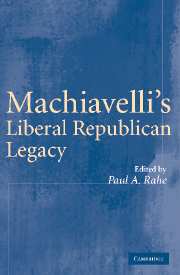Book contents
- Frontmatter
- Contents
- List of Contributors
- Acknowledgments
- Abbreviations and Brief Titles
- Introduction: Machiavelli's Liberal Republican Legacy
- Prologue: Machiavelli's Rapacious Republicanism
- PART I THE ENGLISH COMMONWEALTHMEN
- PART II THE MODERATE ENLIGHTENMENT
- PART III THE AMERICAN FOUNDING
- 7 The American Prince? George Washington's Anti-Machiavellian Moment
- 8 John Adams's Machiavellian Moment
- 9 Thomas Jefferson's Machiavellian Political Science
- 10 James Madison's Princes and Peoples
- 11 Was Alexander Hamilton a Machiavellian Statesman?
- Index
10 - James Madison's Princes and Peoples
Published online by Cambridge University Press: 24 July 2009
- Frontmatter
- Contents
- List of Contributors
- Acknowledgments
- Abbreviations and Brief Titles
- Introduction: Machiavelli's Liberal Republican Legacy
- Prologue: Machiavelli's Rapacious Republicanism
- PART I THE ENGLISH COMMONWEALTHMEN
- PART II THE MODERATE ENLIGHTENMENT
- PART III THE AMERICAN FOUNDING
- 7 The American Prince? George Washington's Anti-Machiavellian Moment
- 8 John Adams's Machiavellian Moment
- 9 Thomas Jefferson's Machiavellian Political Science
- 10 James Madison's Princes and Peoples
- 11 Was Alexander Hamilton a Machiavellian Statesman?
- Index
Summary
Searching for references to Niccolò Machiavelli in the voluminous writings of James Madison is not an especially rewarding exercise. There are precisely three of them, if we are to believe the available indexes, and all are mere notes, acknowledging the authority of the great Florentine but in no way suggesting that he exerted any lasting influence on Madison. Machiavelli first shows up in Madison's adolescent “commonplace” book, where the young Virginian dutifully recorded the opinion of the Cardinal de Retz that most of Machiavelli's readers did not understand him and that others took him “to be a great Politician for no other reason but for having been Wicked” (PJM 1:13). Machiavelli next appears years later, as one of many distinguished writers whose works Madison recommended to the Continental Congress for purchase in 1783 (PJM 6:84). Finally, among the notes that Madison prepared during the controversy over the Bank of the United States in the early 1790s, we find “Machiavel” declaring that the Bank of St. George at Genoa would gradually gain possession of that commercial republic (PJM 13:365). That is the sum of it – hardly the makings of a distinctive Machiavellian interpretation of Madison.
Evidence of direct influence aside, however, there are certain obvious affinities between the two thinkers. Madison is perhaps the outstanding representative in the founding generation of that species of realism and prudence that Machiavelli so signally introduced into political philosophy.
- Type
- Chapter
- Information
- Machiavelli's Liberal Republican Legacy , pp. 229 - 253Publisher: Cambridge University PressPrint publication year: 2005



